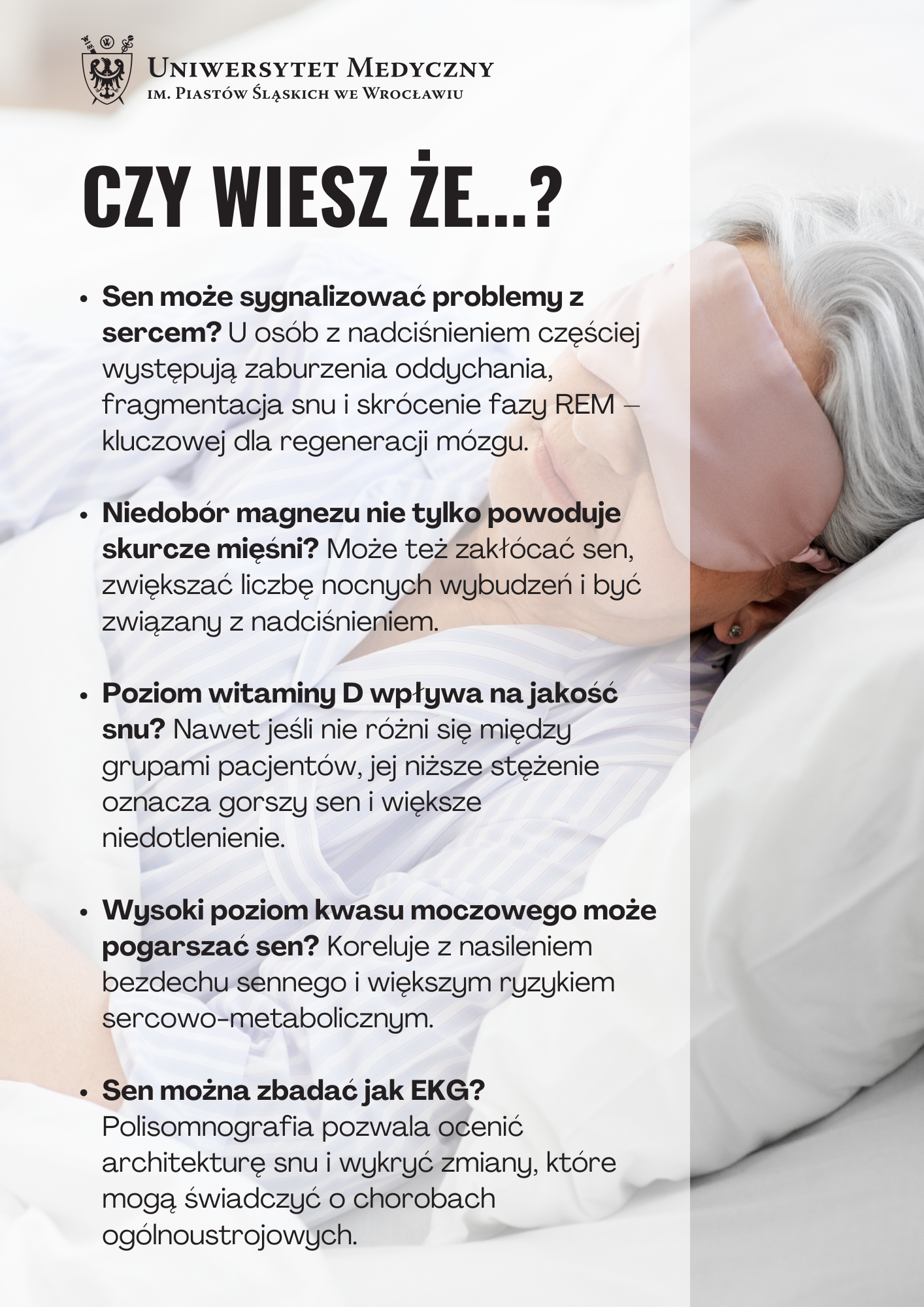
Fatigue despite a good night’s sleep, and awakenings we don’t remember but feel the effects during the day. Oxygen deprivation, which we don’t notice, puts a strain on our hearts. Obstructive sleep apnea ( OSA ) and arterial hypertension (AH) are two disorders that are becoming increasingly common and dangerous over the years.
Researchers from the Wrocław Medical University, in collaboration with the Wrocław University of Environmental and Life Sciences, have discovered that how we sleep can be a barometer not only of cardiovascular health but also of the overall health of the body. They conducted an advanced analysis of sleep architecture, electrolyte levels, and vitamin D in individuals with suspected obstructive sleep apnea. Two groups were identified from 133 patients: those with hypertension and those with normal blood pressure. All underwent overnight polysomnography and blood chemistry analysis. The results reveal much more than just differences in blood pressure.
People with hypertension more often experienced:
– a higher apnea-hypopnea index (AHI),
– greater decreases in oxygen saturation ( oxygen desaturation index – ODI),
– more nighttime awakenings,
– a significantly shortened REM phase, crucial for the regeneration of the nervous system,
– a greater number of nocturnal limb movements ( periodic limb movements in sleep – PLMS).
All this translates into poorer sleep quality with consequences for heart health, metabolism and regenerative abilities.
Vitamin D – not everything is clear
Although vitamin D deficiency is often cited as a risk factor for hypertension, the study found no differences in vitamin D levels between hypertensive and normotensive patients. However, lower vitamin D levels were associated with poorer sleep parameters, including increased apnea and hypoxia.
Magnesium, calcium, uric acid – traces in blood chemistry
The study also showed:
– reduced magnesium levels in patients with hypertension,
– higher levels of uric acid, CRP and glucose,
– a relationship between low magnesium and calcium levels and sleep fragmentation,
– a positive correlation between uric acid levels and the severity of apnea.
This creates a picture of more complex metabolic connections that may promote the development of hypertension and sleep disorders, as well as complicate their treatment.
Conclusions: Sleep as a Biomarker of General Health
The results suggest that sleep quality—assessed objectively using polysomnography—may be a valuable indicator of cardiovascular and metabolic risk. Reduced sleep efficiency, fragmentation, changes in REM sleep duration, and increased nocturnal awakenings may signal underlying health issues, especially in individuals with hypertension.
Did you know that…?
- Could sleep signal heart problems? People with hypertension are more likely to experience breathing disorders, sleep fragmentation, and shortened REM sleep—a key stage for brain regeneration.
- Magnesium deficiency not only causes muscle cramps, but it can also disrupt sleep, increase the number of nighttime awakenings, and be linked to high blood pressure.
- Does vitamin D level affect sleep quality? Even if it doesn’t differ between patient groups, lower levels indicate poorer sleep and greater hypoxia.
- High uric acid levels may worsen sleep. They correlate with increased sleep apnea and higher cardiometabolic risk.
- Sleep can be assessed using an ECG? Polysomnography allows for the assessment of sleep architecture and the detection of changes that may indicate systemic diseases.
Kanclerska J, Wieckiewicz M, Nowacki D, Szymańska-Chabowska A, Poręba R, Mazur G, Martynowicz H. Sleep architecture and vitamin D in hypertensives with obstructive sleep apnea: A polysomnographic study .
Dental and Medical Problems (DMP) is a peer-reviewed scientific journal published by the Wroclaw Medical University. It publishes high-quality original articles, systematic reviews, meta-analyses, and clinical and experimental studies in the fields of dentistry and interdisciplinary medicine.
DMP is indexed in PubMed, Web of Science Core Collection – Emerging Sources Citation Index, Scopus, Embase, ICI Journals Master List, and DOAJ. It received an Impact Factor (JIF) of 3.9 in the latest Clarivate™ Journal Citation Reports™ 2025.







